home study engineering computer science questions and an
home / study / engineering / computer science / questions and answers / - you need to implement simplelinkedstack.java ...
Question: - You need to implement SimpleLinkedSta...
Bookmark
/**
An interface for the ADT stack.
Do not modify this file
*/
package PJ2;
public interface StackInterface<T>
{
/** Gets the current number of data in this stack.
@return the integer number of entries currently in the stack*/
public int size();
/** Adds a new data to the top of this stack.
@param aData an object to be added to the stack */
public void push(T aData);
/** Removes and returns this stack\'s top data.
@return either the object at the top of the stack or,
if the stack is empty before the operation, null */
public T pop();
/** Retrieves this stack\'s top data.
@return either the data at the top of the stack or
null if the stack is empty */
public T peek();
/** Detects whether this stack is empty.
@return true if the stack is empty */
public boolean empty();
/** Removes all data from this stack */
public void clear();
} // end StackInterface
/**
A class of stacks whose entries are stored in a chain of nodes.
Implement all methods in SimpleLinkedStack class using
the inner Node class.
Main Reference : text book or class notes
Do not change or add data fields
Do not add new methods
You may access Node object fields directly, i.e. data and next
*/
package PJ2;
public class SimpleLinkedStack<T> implements StackInterface<T>
{
// Data fields
private Node topNode; // references the first node in the chain
private int count; // number of data in this stack
public SimpleLinkedStack()
{
// add stataments
} // end default constructor
public void push(T newData)
{
// add stataments
} // end push
public T peek()
{
// add stataments
return null;
} // end peek
public T pop()
{
// add stataments
return null;
} // end pop
public boolean empty()
{
// add stataments
return false;
} // end empty
public int size()
{
// add stataments
return -1;
} // end isEmpty
public void clear()
{
// add stataments
} // end clear
public String toString()
{
// add stataments
// note: data class in stack must implement toString() method
// return a list of data in Stack, separate them with \',\'
return \"\";
}
/****************************************************
private inner node class
Do not modify this class!!
you may access data and next directly
***************************************************/
private class Node
{
private T data; // entry in list
private Node next; // link to next node
private Node (T dataPortion)
{
data = dataPortion;
next = null; // set next to NULL
} // end constructor
private Node (T dataPortion, Node nextNode)
{
data = dataPortion;
next = nextNode; // set next to refer to nextNode
} // end constructor
} // end Node
/****************************************************
Do not modify: Stack test
****************************************************/
public static void main (String args[])
{
System.out.println(\"\ \"+
\"*******************************************************\ \"+
\"Sample Expected output:\ \"+
\"\ \"+
\"OK: stack is empty\ \"+
\"Push 3 data: 10, 30, 50\ \"+
\"Print stack [50,30,10,]\ \"+
\"OK: stack size is 3\ \"+
\"OK: peek stack top is 50\ \"+
\"OK: stack is not empty\ \"+
\"Pop 2 data: 50, 30\ \"+
\"Print stack [30,10,]\ \"+
\"Print stack [10,]\ \"+
\"OK: stack pop data is 30\ \"+
\"Clear stack\ \"+
\"Print stack []\ \"+
\"\ \"+
\"*******************************************************\");
System.out.println(\"\ Your Test output:\ \");
StackInterface<Integer> s = new SimpleLinkedStack<Integer>();
if (s.empty())
System.out.println(\"OK: stack is empty\");
else
System.out.println(\"Error: stack is not empty\");
s.push(10);
s.push(30);
s.push(50);
System.out.println(\"Push 3 data: 10, 30, 50\");
System.out.println(\"Print stack \" + s);
if (s.size() == 3)
System.out.println(\"OK: stack size is 3\");
else
System.out.println(\"Error: stack size is \" + s.size());
if (s.peek() == 50)
System.out.println(\"OK: peek stack top is 50\");
else
System.out.println(\"Error: peek stack top is \" + s.size());
if (!s.empty())
System.out.println(\"OK: stack is not empty\");
else
System.out.println(\"Error: stack is empty\");
System.out.println(\"Pop 2 data: 50, 30\");
s.pop();
System.out.println(\"Print stack \" + s);
int data=s.pop();
System.out.println(\"Print stack \" + s);
if (data == 30)
System.out.println(\"OK: stack pop data is 30\");
else
System.out.println(\"Error: stack pop data is \" + data);
System.out.println(\"Clear stack\");
s.clear();
System.out.println(\"Print stack \" + s);
}
} // end Stack
Solution
/**
An interface for the ADT stack.
Do not modify this file
*/
package PJ2;
public interface StackInterface<T> {
/**
* Gets the current number of data in this stack.
*
* @return the integer number of entries currently in the stack
*/
public int size();
/**
* Adds a new data to the top of this stack.
*
* @param aData
* an object to be added to the stack
*/
public void push(T aData);
/**
* Removes and returns this stack\'s top data.
*
* @return either the object at the top of the stack or, if the stack is
* empty before the operation, null
*/
public T pop();
/**
* Retrieves this stack\'s top data.
*
* @return either the data at the top of the stack or null if the stack is
* empty
*/
public T peek();
/**
* Detects whether this stack is empty.
*
* @return true if the stack is empty
*/
public boolean empty();
/** Removes all data from this stack */
public void clear();
} // end StackInterface
/**
A class of stacks whose entries are stored in a chain of nodes.
Implement all methods in SimpleLinkedStack class using
the inner Node class.
Main Reference : text book or class notes
Do not change or add data fields
Do not add new methods
You may access Node object fields directly, i.e. data and next
*/
package PJ2;
import java.util.NoSuchElementException;
public class SimpleLinkedStack<T> implements StackInterface<T> {
// Data fields
private Node topNode; // references the first node in the chain
private int count; // number of data in this stack
public SimpleLinkedStack() {
// add stataments
topNode = null;
count = 0;
} // end default constructor
public void push(T newData) {
// add stataments
Node oldTop = topNode;
topNode = new Node(newData);
// topNode.data=newData;
topNode.next = oldTop;
count++;
} // end push
public boolean isEmpty() {
return topNode == null;
}
public T peek() {
if (isEmpty())
throw new NoSuchElementException(\"Stack underflow\");
return topNode.data;
} // end peek
public T pop() {
// add stataments
// add stataments
if (isEmpty())
throw new NoSuchElementException(\"Stack underflow\");
T item = topNode.data; // save item to return
topNode = topNode.next; // delete first node
count--;
return item;
} // end pop
public boolean empty() {
// add stataments
return false;
} // end empty
public int size() {
// add stataments
return count;
} // end isEmpty
public void clear() {
// add stataments
topNode = null;
count = 0;
} // end clear
public String toString() {
// add stataments
// note: data class in stack must implement toString() method
// return a list of data in Stack, separate them with \',\'
StringBuilder builder = new StringBuilder();
Node current = topNode;
while (current != null) {
builder.append(current.data).append(\",\");
current = current.next;
}
return builder.toString();
}
/****************************************************
* private inner node class Do not modify this class!! you may access data
* and next directly
***************************************************/
private class Node {
private T data; // entry in list
private Node next; // link to next node
private Node(T dataPortion) {
data = dataPortion;
next = null; // set next to NULL
} // end constructor
private Node(T dataPortion, Node nextNode) {
data = dataPortion;
next = nextNode; // set next to refer to nextNode
} // end constructor
} // end Node
/****************************************************
* Do not modify: Stack test
****************************************************/
public static void main(String args[]) {
System.out.println(\"\ \"
+ \"*******************************************************\ \"
+ \"Sample Expected output:\ \" + \"\ \" + \"OK: stack is empty\ \"
+ \"Push 3 data: 10, 30, 50\ \" + \"Print stack [50,30,10,]\ \"
+ \"OK: stack size is 3\ \" + \"OK: peek stack top is 50\ \"
+ \"OK: stack is not empty\ \" + \"Pop 2 data: 50, 30\ \"
+ \"Print stack [30,10,]\ \" + \"Print stack [10,]\ \"
+ \"OK: stack pop data is 30\ \" + \"Clear stack\ \"
+ \"Print stack []\ \" + \"\ \"
+ \"*******************************************************\");
System.out.println(\"\ Your Test output:\ \");
StackInterface<Integer> s = new SimpleLinkedStack<Integer>();
if (s.empty())
System.out.println(\"OK: stack is empty\");
else
System.out.println(\"Error: stack is not empty\");
s.push(10);
s.push(30);
s.push(50);
System.out.println(\"Push 3 data: 10, 30, 50\");
System.out.println(\"Print stack \" + s);
if (s.size() == 3)
System.out.println(\"OK: stack size is 3\");
else
System.out.println(\"Error: stack size is \" + s.size());
if (s.peek() == 50)
System.out.println(\"OK: peek stack top is 50\");
else
System.out.println(\"Error: peek stack top is \" + s.size());
if (!s.empty())
System.out.println(\"OK: stack is not empty\");
else
System.out.println(\"Error: stack is empty\");
System.out.println(\"Pop 2 data: 50, 30\");
s.pop();
System.out.println(\"Print stack \" + s);
int data = s.pop();
System.out.println(\"Print stack \" + s);
if (data == 30)
System.out.println(\"OK: stack pop data is 30\");
else
System.out.println(\"Error: stack pop data is \" + data);
System.out.println(\"Clear stack\");
s.clear();
System.out.println(\"Print stack \" + s);
}
} // end Stack
OUTPUT:
*******************************************************
Sample Expected output:
OK: stack is empty
Push 3 data: 10, 30, 50
Print stack [50,30,10,]
OK: stack size is 3
OK: peek stack top is 50
OK: stack is not empty
Pop 2 data: 50, 30
Print stack [30,10,]
Print stack [10,]
OK: stack pop data is 30
Clear stack
Print stack []
*******************************************************
Your Test output:
Error: stack is not empty
Push 3 data: 10, 30, 50
Print stack 50,30,10,
OK: stack size is 3
OK: peek stack top is 50
OK: stack is not empty
Pop 2 data: 50, 30
Print stack 30,10,
Print stack 10,
OK: stack pop data is 30
Clear stack
Print stack
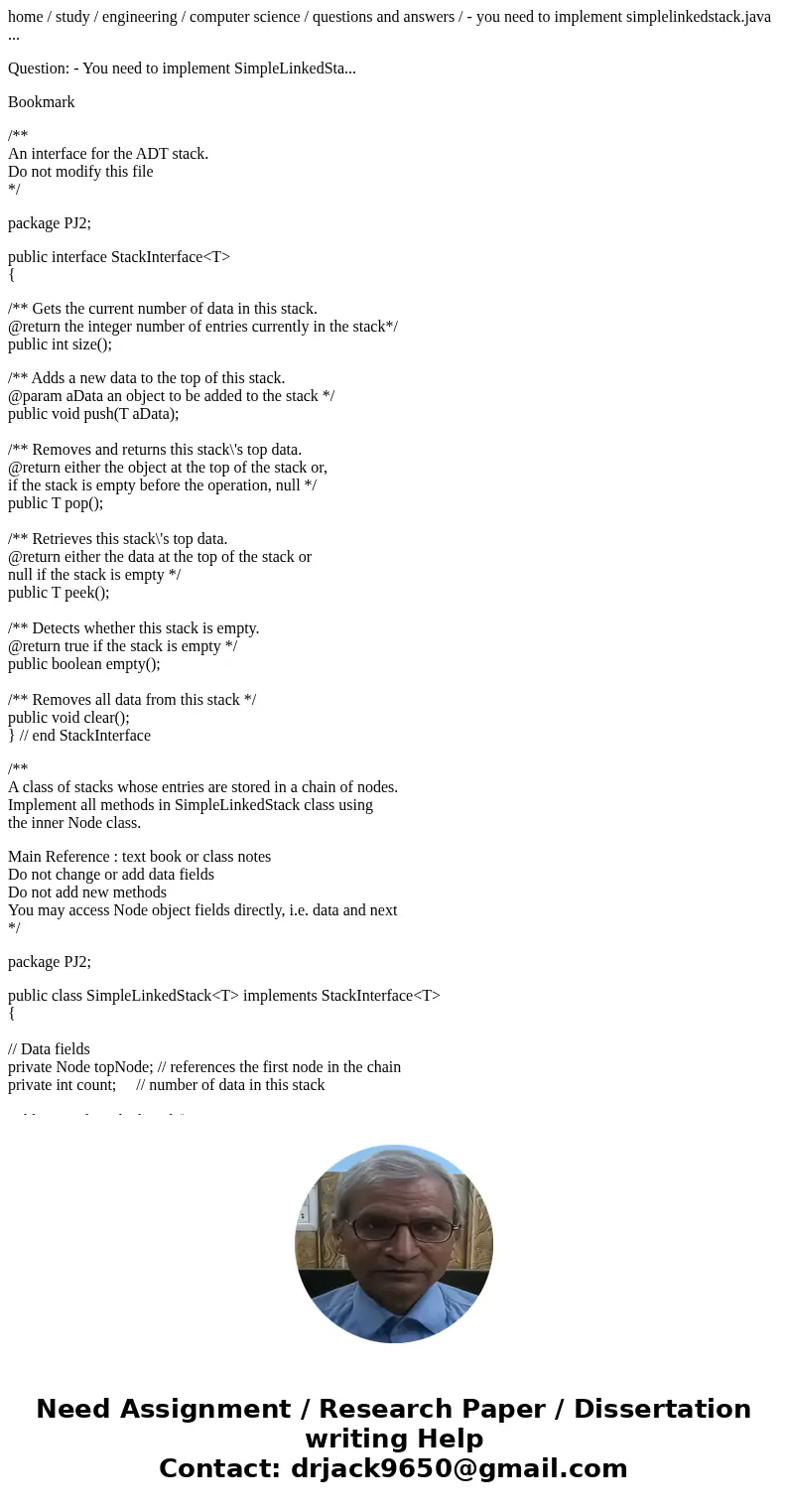
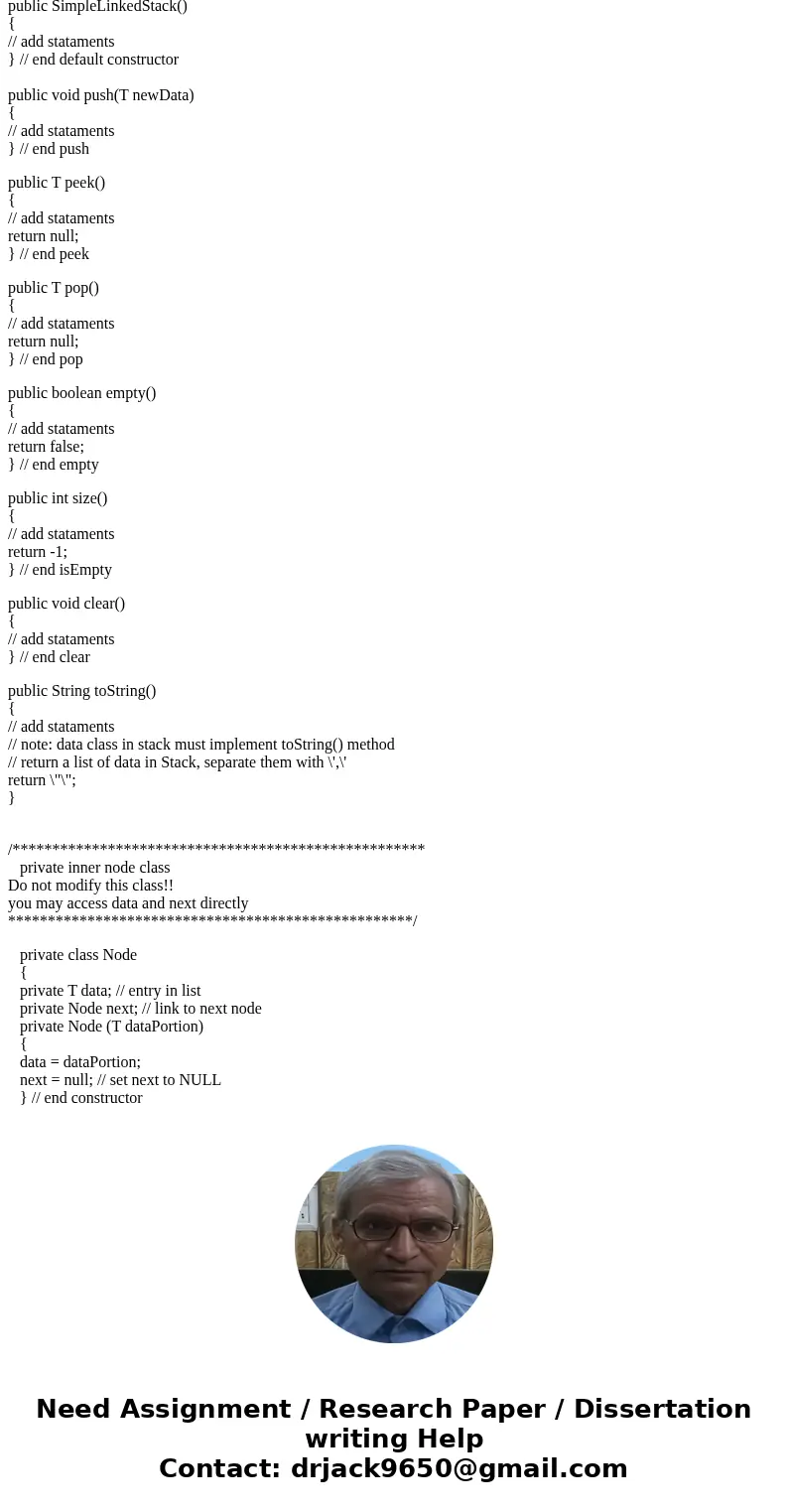
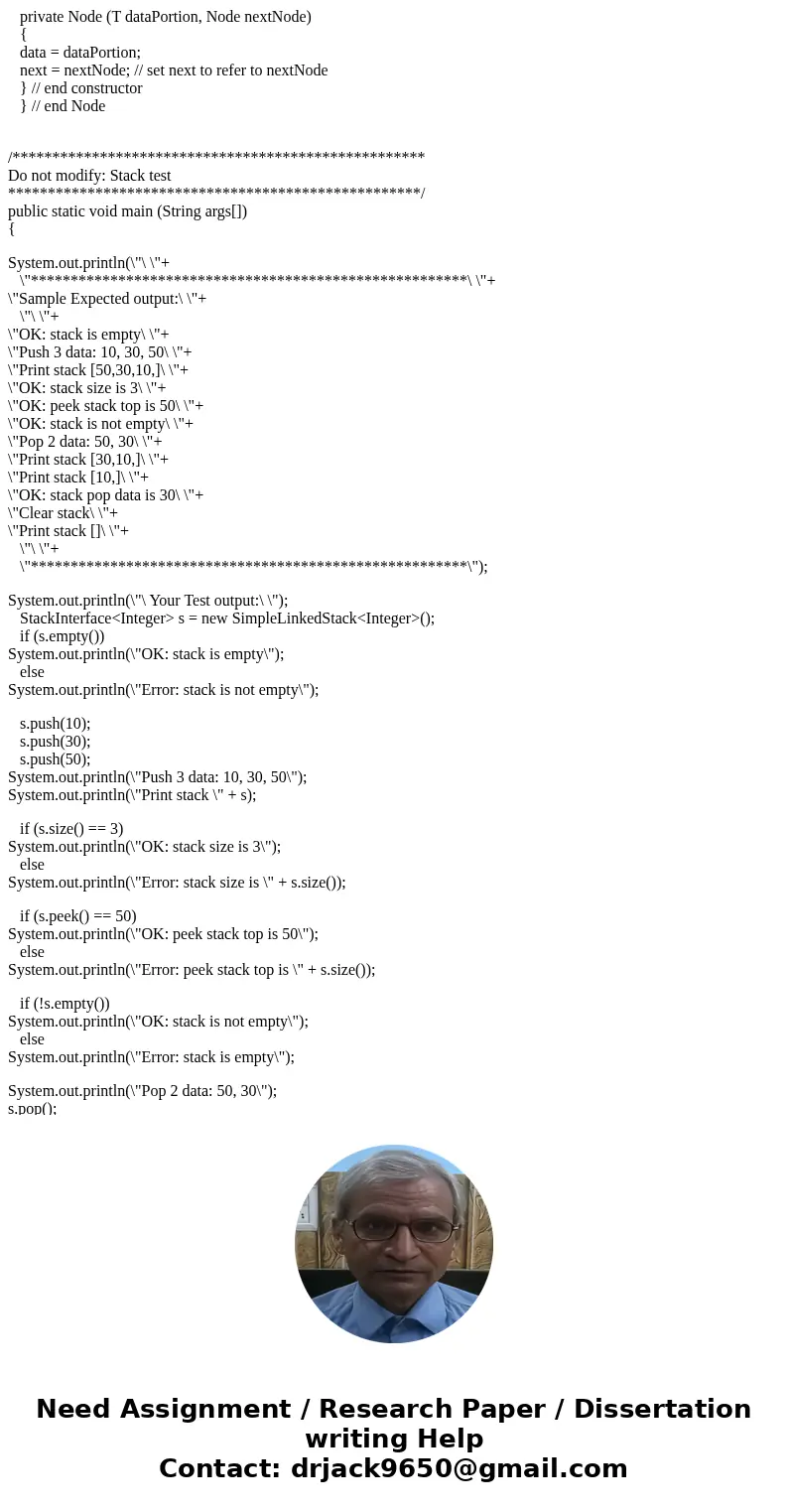
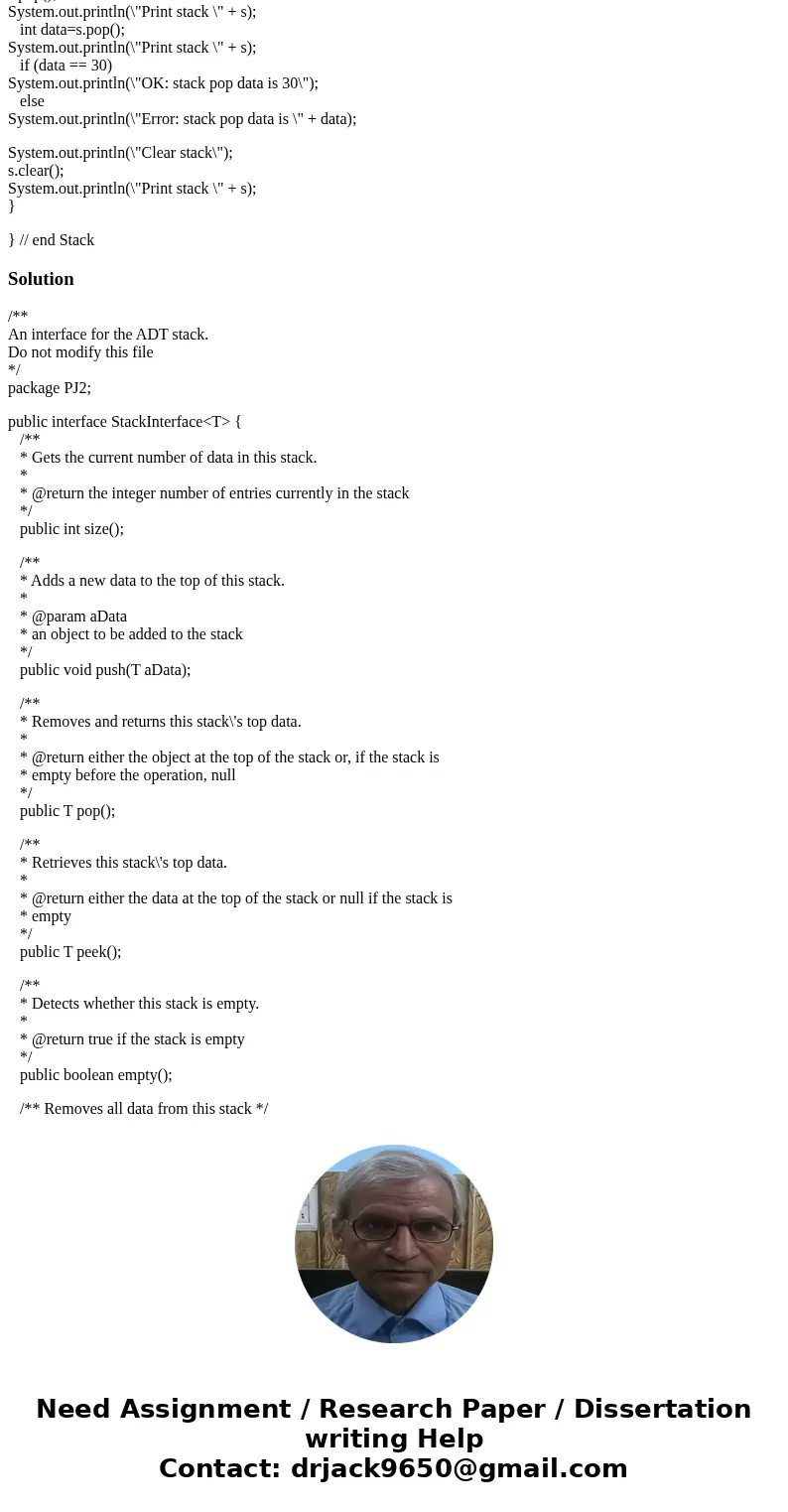
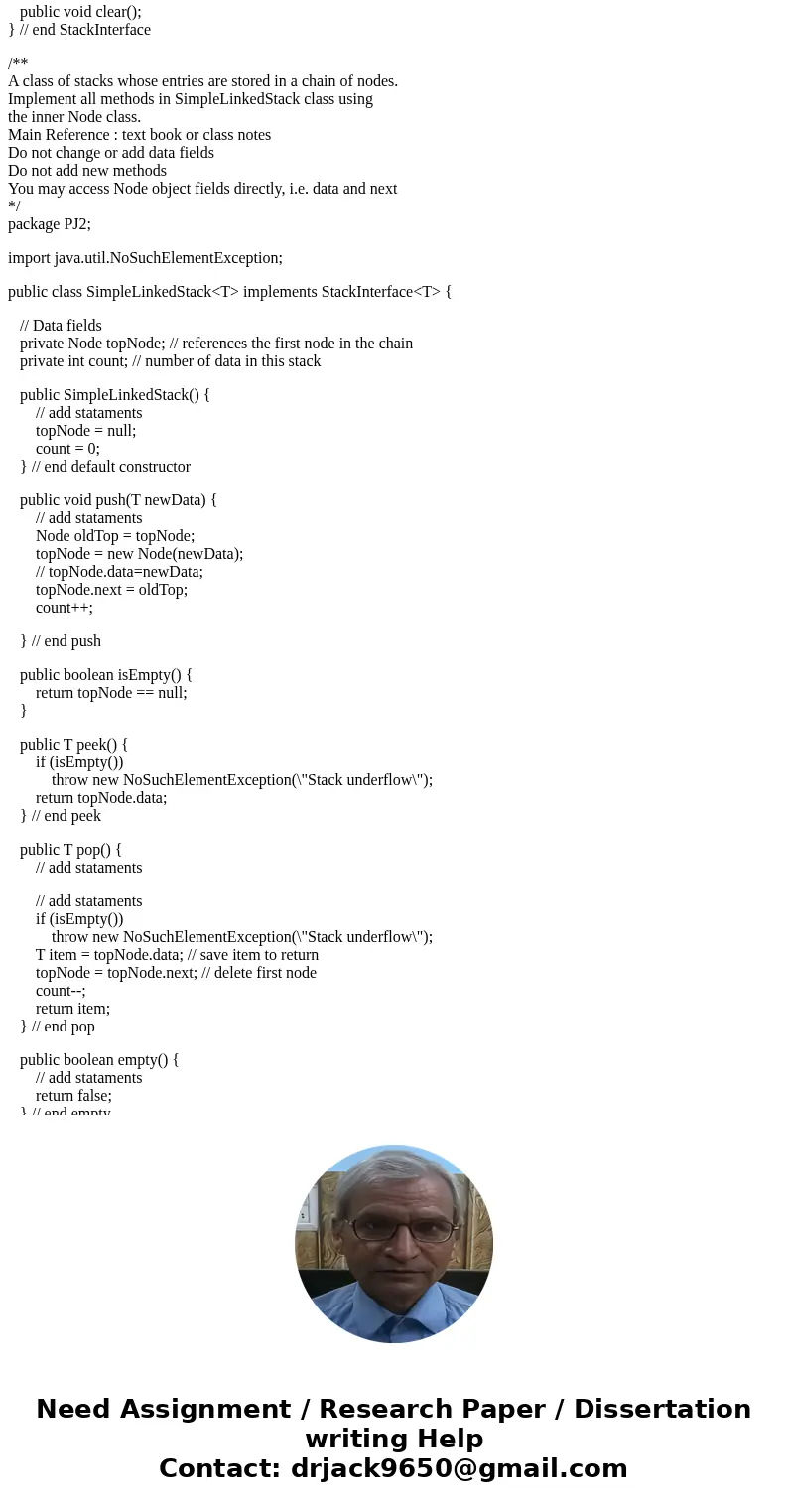
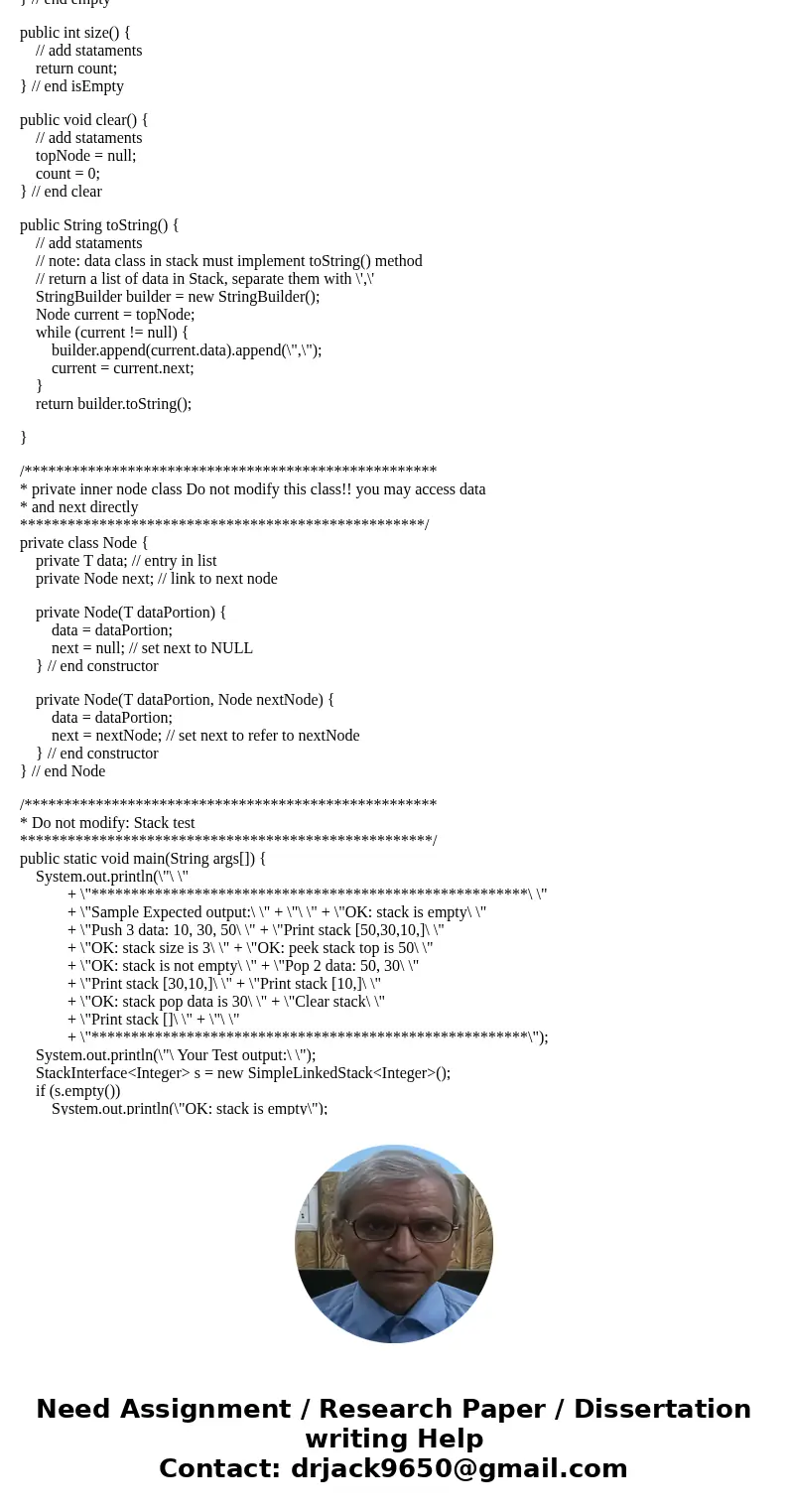
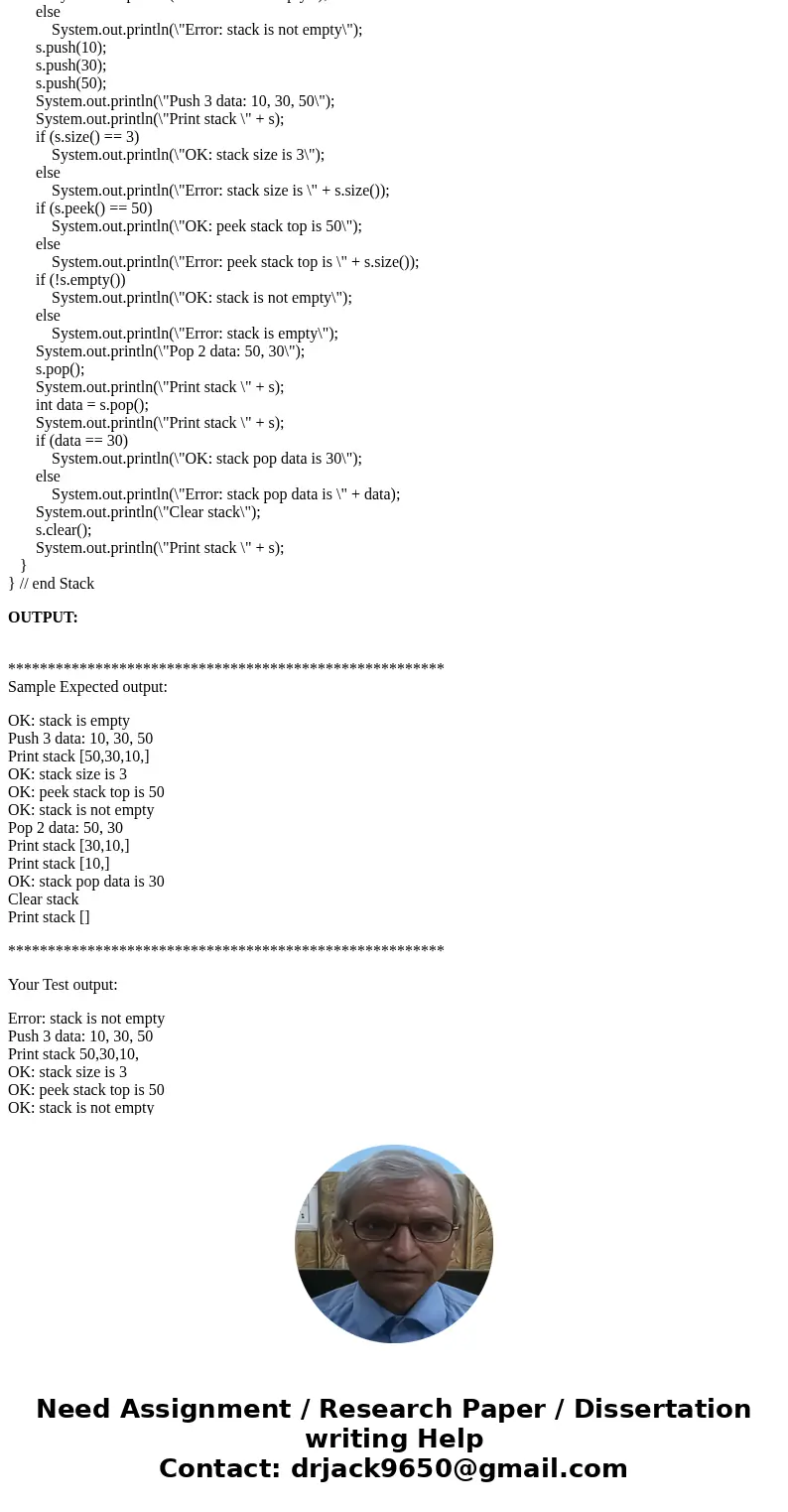
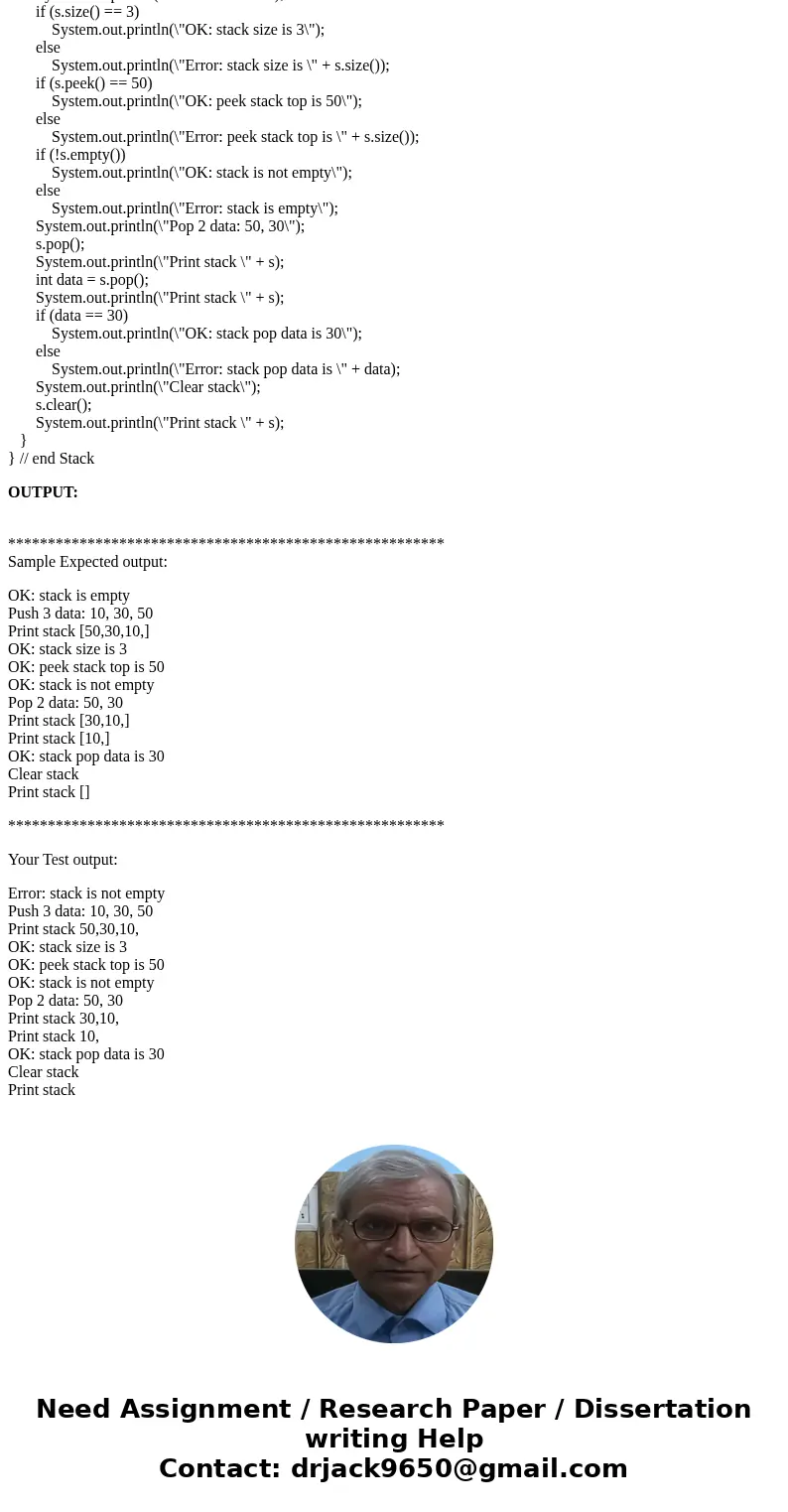
 Homework Sourse
Homework Sourse